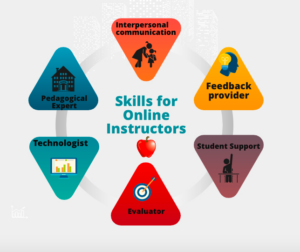
Instructor Roles: Online and Face to Face
Reflecting on the articles and videos this week, it became clear that the research on roles for online instructors has predominantly focused on post-secondary students. This observation made me question whether these parameters fully encapsulate the essential traits online instructors need because it does not consider all instructors. As an online instructor in a post-secondary institution with experience in a public school setting in online classrooms, I understand the centrality of the adminstrative roles in synchronous and asynchronous environments for all age ranges. While the planning, managing, and technological expert components are crucial and highly rated (Carril et al., 2013, p. 466-467), they are also the most teacher-centered, hands-off components. These competencies outline how to build the course and ensure students can navigate, which is a fundamental component of success for the learner. However, teacher competency must, more importantly, consider how to address the student’s learning, highlighting the need for a more comprehensive understanding of the instructor’s role in online education.
As online environments become increasingly prevalent in K-12 education, it’s crucial to consider the unique needs of these students. Unlike their post-secondary counterparts, who are typically independent learners, K-12 students require more than just clear routines, expectations, and assessments. They need guidance, relationship-building, and teaching that goes beyond procedural organization. As Bailie (2011, p. 88) aptly puts it, ‘ high-quality instruction will continue to be based on an array of distinct competencies attributed solely to instructors and their application of sound pedagogical practice. ‘ This includes all aspects of teaching, whether face-to-face or online. After all, simply placing a textbook before a student does not guarantee learning, regardless of their age.
Teaching Philosophy
First, I believe education needs to be purposeful in the planning, implementation, delivery, and assessment. Next, all people can and do learn when presented with a nurturing, inclusive environment that is safe and able to meet their needs academically, socially, and emotionally. Finally, all partners in education need to develop a growth mindset where they set goals, reflect, and actively participate in the educational process. My answer would be congruent when I compare teaching and learning online versus face-to-face. They are the same because teaching is teaching, and learning is learning. The location, modality, or flexibility should not change the core teaching ideals or purpose. Both venues should emphasize all the best practices of both learning environments.
References
Bailie, J. L. (2011). Effective online instructional competencies as perceived by online university faculty and students: A sequel study. Journal of Online Learning and Teaching, 7(1), 82. http://jolt.merlot.org/vol7no1/bailie_0311.pdf
Carril, P. C. M., Sanmamed, M. G., & Sellés, N. H. (2013). Pedagogical roles and competencies of university teachers practicing in the e-learning environment. The International Review of Research in Open and Distributed Learning, 14(3), 462-487. http://www.irrodl.org/index.php/ irrodl/article/view/147

Hi Hannah,
I appreciated your focus on how the research really focuses more on post-secondary – the needs for students in K-12 will be very different, and I think this disparity was very much encountered during the early pandemic when schools were closed. I think it also really demonstrated the role that schools play outside just the learning process – to provide other supports and spaces for students. If you are looking for some research on virtual schooling for K-12, search for Michael Barbour as he has focused on this area. Beyhan Farhadi also looks at policies related to K-12 online learning (and provides critiques of the Ontario governments move to made it mandatory)…https://beyhanfarhadi.com/publications/
I also appreciated how you made the point that the role of the online instructors needs to go beyond structures/resources to establishing relationships and providing support for learning. As we progress in the course and readings, it will be interesting to see what strategies you develop for this aspect of the online environment.
Michelle
Thank you for the extra resources for K-12. I will definitely look them over. I am very much looking forward to learning more strategies as we move through the course.